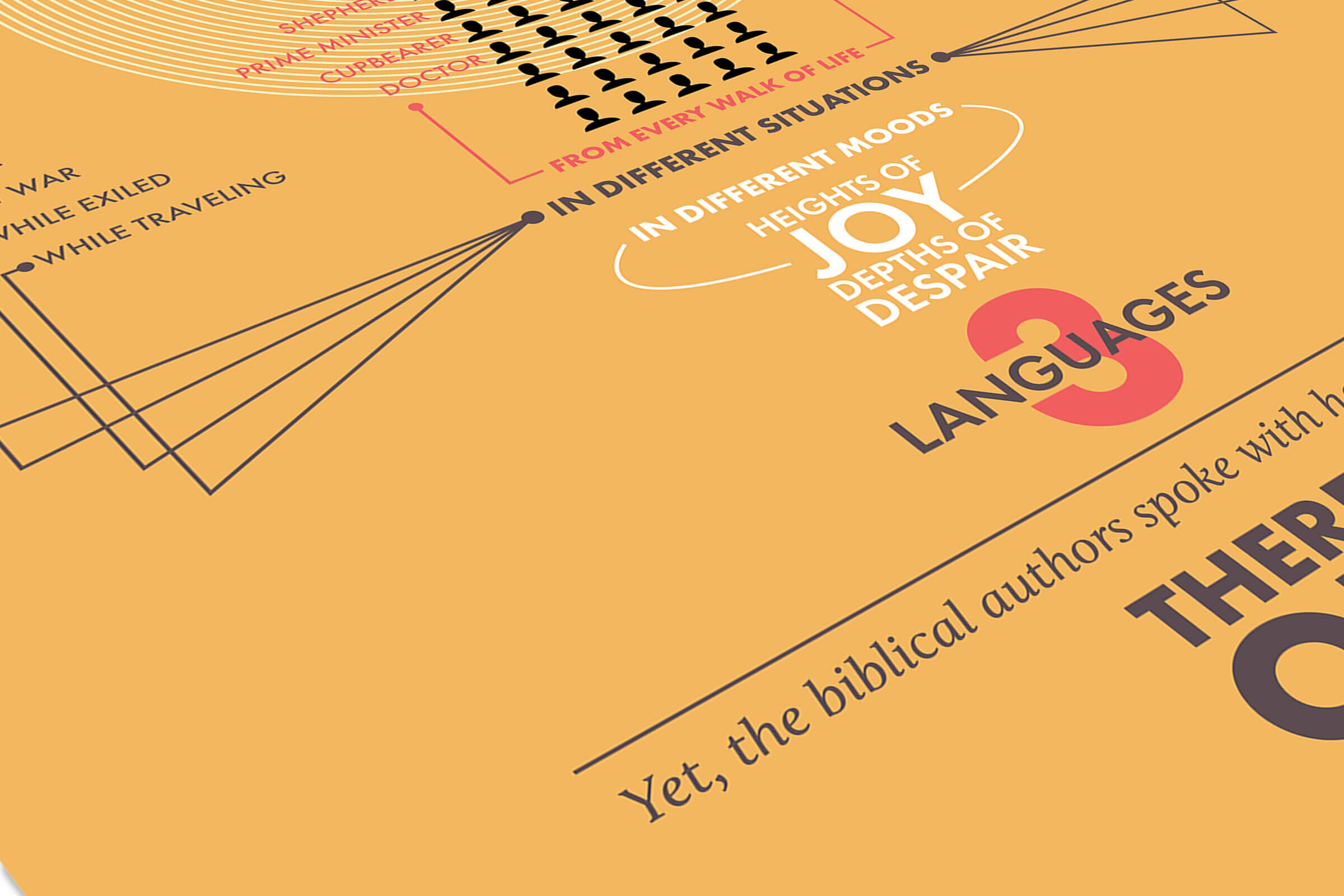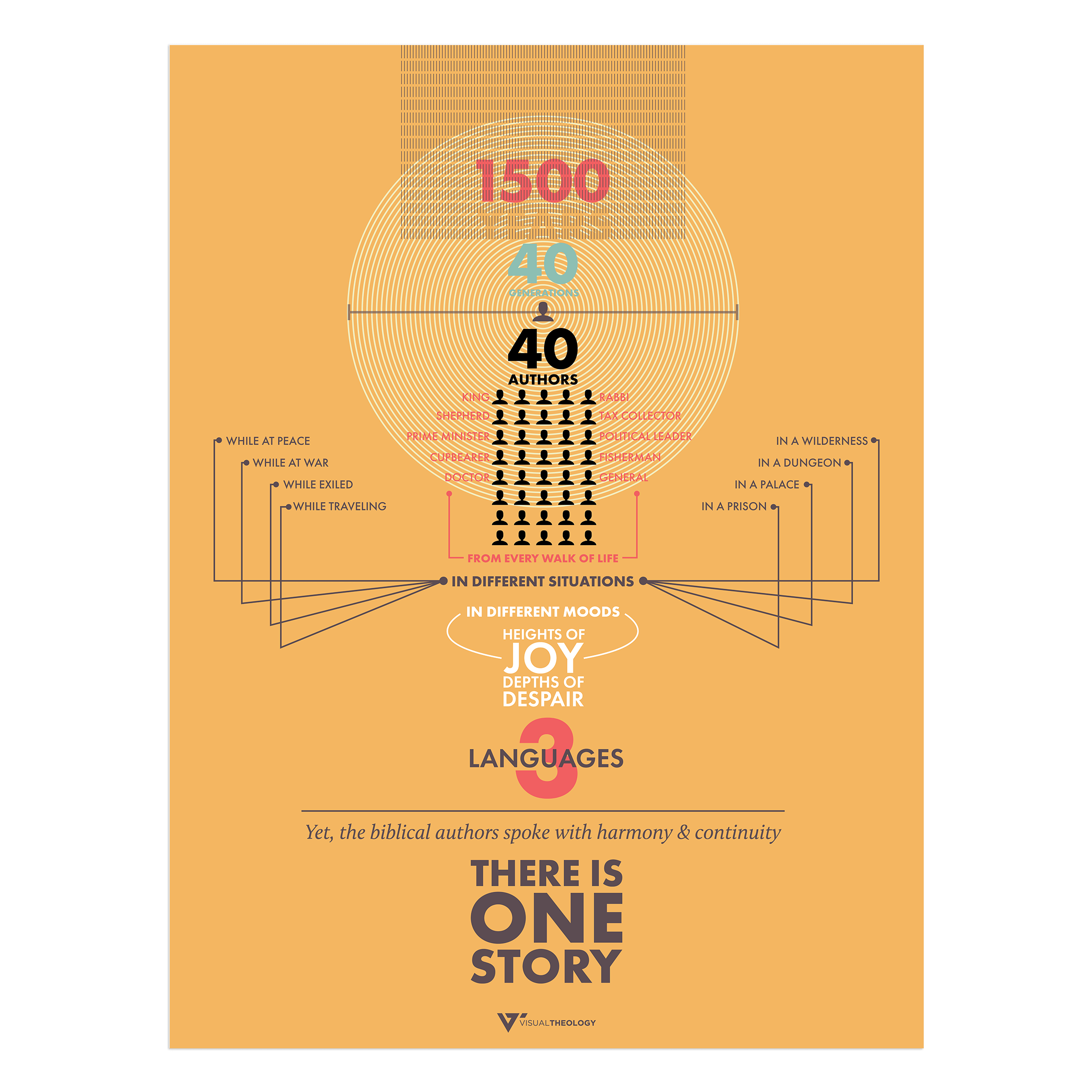
1: The Bible is one story
It may be surprising to you, but the Bible is not merely a random collection of religious ideas but a cohesive story. This makes the Bible unlike any other book. Josh McDowell points out that the Bible was “written over 1500 years; written over 40 generations; written by more than 40 authors, from every walk of life— including kings, peasants, philosophers, fishermen, poets, statesmen, scholars, etc.” 4
He explains how Moses was a political leader, trained in the universities of Egypt and the Apostle Peter was a fisherman. He says, “Amos was a herdsman, Joshua, a military general, Nehemiah, a cupbearer, Daniel, a prime minister, Luke, a doctor, Solomon, a king, Matthew, a tax collector, and Paul, a rabbi.” 5
Not only was the Bible written by dozens of people over a long period of time, but it was written in different places. The Bible was written in prisons and palaces, grasslands and wastelands. It was written during times of war and in times of peace. The Bible speaks of both the greatest joy and the most profound sorrow. Finally, the Bible — perhaps more than any other book — includes some of the most controversial topics.
And yet, from Genesis to Revelation, there is complete continuity. The Bible is one unfolding story. 6
2: The Bible has many writers but one Author
While the Bible has many writers, it has one Author. Paul says, “All Scripture is breathed out by God and profitable for teaching, for reproof, for correction, and for training in righteousness, that the man of God may be complete, equipped for every good work (2 Timothy 3:16-17).” In other words, when you read the Bible, you are reading the very words of God.
Throughout the Bible, we see that God used human authors, guided by the Holy Spirit, to give us his exact words. Justin Peters says, “If you want to hear God speak, read the Bible. If you want to hear him speak audibly, read it out loud.”
Don’t miss the profound significance of this reality. You and I have access to the very words of God. Understand, when God speaks, it’s not as you or I speak. “Mountain, mommy, look, it’s a mountain,” your daughter says. You know what she means. But she did not speak the mountain. She did not bring it into existence from nothing. In the beginning, God spoke the word “mountain,” and pouring from his mouth came the mountain itself. He does not speak mere words. He speaks the very things themselves: his voice is the mountain’s existence.
Every molecule in your body, every ocean and body of water, every tree, boulder, iceberg, planet, fruit, animal, mineral, and person owes its existence to him. If he were to stop speaking for even a moment, everything you see and even things you don’t see would dissolve into oblivion. “That thing in your yard, that mangy apple or towering spruce, that thing is not the referent of His Word. It is his word and its referent.
If he were to stop talking, it wouldn’t be there.” [7] And yet, here we are — he upholds the universe by the word of his power. When you look up at the sky, every galaxy you see was created and is sustained by Him. When you look down at the ground, every ant you step on owes its existence to him. Without him, nothing was created that has been created. He is transcendent above all. And while all of creation declares his glory, the reality is that you and I would not know what he is like had he not chosen to reveal himself — in a specific way — through his word.
You and I can only know God because he has chosen to reveal himself in the Bible. So before we move too quickly past the fact that God breathes out the Bible, understand that there is nothing more powerful in all creation than the word of God, and we have access to it.
3: The Bible has one hero
Not only is the Bible one story with one Author, but there’s also one Hero. Every good story has a hero. In Lord of the Rings, we read about Frodo. In The Chronicles of Narnia, we are captivated by Aslan, and watching BigHero 6, we can’t help but love Baymax.
Good stories center around heroes who don’t run away from danger but rather move towards it — men and women who sacrifice for the good of those in need. There is no better example of this than the example of Jesus. From beginning to end, the Bible points to him.
Understand, you are important, but you’re not the point — Jesus is. The story of the Bible is the story of Jesus protecting his bride — the church — and destroying sin, Satan, death, and hell. Dan Dewitt says, “The Bible is about God coming to do what Adam should have done in the first place. God would come in the flesh, step into human history, and write himself into this twisted story to begin setting things right.” [8]
The Apostle Paul says that Jesus is the image of the invisible God (Colossians 1:15). John says that he is the Word of God made flesh (John 1:14), and in Genesis, Jesus is the Serpent crusher. In Psalms, he is The Shepherd who leads us by still waters, and in Proverbs, he is the Wisdom of God. In Isaiah, he is Wonderful Counselor and the one crushed for our iniquity. In Matthew, he is a humble king riding on a donkey. In Luke, he is one who came to serve. In John, he is the Lamb of God who takes away the sin of the world and The Shepherd who lays down his life for the sheep. In Romans, he is the true and better Adam; in Revelation, he is both the Lamb slain before the foundation of the world and the Lion of the tribe of Judah who has conquered death and will reign forever. This is why the Apostle Paul says, “He is before all things, and in him, all things hold together (Colossians 1:17).”
Jesus is the purpose and focal point of the entire Bible. The Bible is written to you so that your affections would be for Jesus. He is the ultimate hero — he gave his life so that you and I could be restored. He embraced suffering so that he could meet you in yours. He experienced pain so that he could sympathize with you in weakness. He was rejected by God, so you never have to be. And now, through his death, burial, and resurrection, he is inviting us into a relationship with him.
The Bible is a true story of God’s rescue mission. C.S. Lewis said, “Christianity is the story of how the rightful king has landed, you might say landed in disguise, and is calling us to take part in a great campaign of sabotage.” [9] From the beginning, we’ve fallen short, but our story is not without a hero. Look around, and you will see that the world is not what it should be. You and I are broken, and our stories are filled with pain. But we know the end of the story. Jesus has made restoration possible and one day will return as King and set things right. There is no story more compelling and no invitation more welcoming.
This is the story of the Bible.
- https://thestorytelleragency.com/goodreads/50-best-quotes-for-storytelling (back)
- https://thestorytelleragency.com/goodreads/50-best-quotes-for-storytelling (back)
- https://thestorytelleragency.com/goodreads/50-best-quotes-for-storytelling (back)
- Josh McDowell, compiled by Bill Wilson, A READY DEFENSE, Thomas Nelson Publishers, © 1993 pp. 27, 28. (back)
- Josh McDowell, compiled by Bill Wilson, A READY DEFENSE, Thomas Nelson Publishers, © 1993 pp. 27, 28. (back)
- Josh McDowell, compiled by Bill Wilson, A READY DEFENSE, Thomas Nelson Publishers, © 1993 pp. 27, 28. (back)
- N.D. Wilson, Notes From The Tilt-A-Whirl, pg. 16. (back)
- Dan Dewitt, Life in the Wild, pg. 16. (back)
- C.S. Lewis, Mere Christianity, pg. 45. (back)







